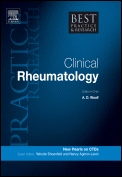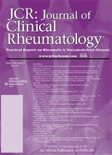
International Journal of Rheumatic Diseases
Scope & Guideline
Elevating the discourse on rheumatology.
Introduction
Aims and Scopes
- Clinical Research in Rheumatic Diseases:
The journal publishes original research focused on the clinical aspects of rheumatic diseases, including treatment outcomes, patient management strategies, and the evaluation of therapeutic interventions. - Experimental and Translational Research:
Research that explores the underlying mechanisms of rheumatic diseases, including genetic, immunological, and environmental factors, is a key focus area, aiming to translate findings into clinical practice. - Epidemiological Studies:
The journal includes studies that examine the prevalence, incidence, and risk factors associated with rheumatic diseases, contributing to a better understanding of these conditions in different populations. - Innovative Therapeutic Approaches:
Research on new pharmacological treatments, including biologics and targeted therapies, as well as traditional and complementary medicine approaches, is highlighted. - Patient-Centered Care:
The journal emphasizes research that improves patient quality of life, including studies on psychosocial aspects, healthcare utilization, and patient education. - Multidisciplinary Approaches:
The journal encourages interdisciplinary research that involves collaboration among rheumatologists, immunologists, physiotherapists, and other healthcare professionals to optimize patient outcomes.
Trending and Emerging
- Impact of COVID-19 on Rheumatic Diseases:
A significant number of studies are focusing on the effects of COVID-19 on patients with rheumatic diseases, including vaccine responses, disease flares, and management strategies during the pandemic. - Biologics and Targeted Therapies:
There is an increasing emphasis on research related to the efficacy, safety, and long-term outcomes of biologic therapies and JAK inhibitors, reflecting the ongoing evolution of treatment paradigms in rheumatology. - Microbiome and Autoimmunity:
Emerging research is exploring the relationship between gut microbiota and autoimmune diseases, suggesting potential therapeutic targets and new insights into disease pathogenesis. - Personalized Medicine in Rheumatology:
Studies focusing on personalized approaches to treatment based on genetic, environmental, and clinical factors are becoming more prevalent, emphasizing the need for tailored therapies. - Patient-Reported Outcomes and Quality of Life:
There is a growing focus on understanding patient-reported outcomes and quality of life measures, reflecting an increasing recognition of the importance of patient-centered care in rheumatology. - Multimorbidity and Comorbid Conditions:
Research exploring the intersection of rheumatic diseases with other chronic conditions, such as cardiovascular disease and diabetes, is gaining importance as it impacts treatment strategies and patient management.
Declining or Waning
- Traditional Therapeutic Approaches:
Research on conventional treatments, such as non-steroidal anti-inflammatory drugs (NSAIDs) and older disease-modifying anti-rheumatic drugs (DMARDs), has seen a decrease, likely overshadowed by the rapid development of biologics and JAK inhibitors. - Basic Science without Clinical Application:
Studies focused purely on basic science findings, without clear pathways to clinical application or relevance to patient care, seem to be less frequently published, indicating a shift towards more translational research. - Single-Center Studies:
The prevalence of single-center studies is declining, as there is a growing emphasis on multicenter, larger scale studies that offer broader insights and greater generalizability to findings. - Descriptive Epidemiological Studies:
While epidemiological research remains important, there appears to be a decline in purely descriptive studies that do not incorporate advanced analytical methods or novel insights into disease mechanisms.
Similar Journals

SCANDINAVIAN JOURNAL OF RHEUMATOLOGY
Driving Excellence in Rheumatology ScholarshipThe Scandinavian Journal of Rheumatology, published by Taylor & Francis Ltd, is a prestigious peer-reviewed journal dedicated to advancing research in the fields of rheumatology, immunology, and related disciplines. With an ISSN of 0300-9742 and an E-ISSN of 1502-7732, this journal has established itself as a vital platform for disseminating significant findings and innovative approaches in the management of rheumatic diseases since its inception in 1959. As a recognized scholarly outlet, it currently resides within the Q2 category for Medicine (miscellaneous) and ranks #39 out of 73 in Rheumatology according to the 2023 Scopus assessments. This reflects the journal's commitment to high-quality research and its relevance in the scientific community. Although it does not provide Open Access options, the journal's rigorous selection process ensures that only the most impactful research reaches its audience, making it a crucial resource for researchers, clinicians, and students engaged in the exploration of rheumatological and immunological challenges. The journal's broad scope encompasses ongoing studies, clinical trials, and reviews that aim to enhance understanding and treatment of rheumatic conditions, promoting collaboration and knowledge-sharing among professionals in the field.

BEST PRACTICE & RESEARCH IN CLINICAL RHEUMATOLOGY
Transforming Insights into Best PracticesBEST PRACTICE & RESEARCH IN CLINICAL RHEUMATOLOGY, published by Elsevier, stands as a premier journal in the field of rheumatology, holding a prestigious Q1 ranking in both Medicine (miscellaneous) and Rheumatology categories as of 2023. With an ISSN of 1521-6942 and an E-ISSN of 1521-1770, the journal is dedicated to advancing clinical knowledge and practice through the dissemination of high-quality, peer-reviewed research. Since its inception in 1995, this journal has provided a platform for researchers, clinicians, and healthcare providers to share significant advancements, best practices, and innovative insights that shape the standards of care in rheumatology. The commitment to open access publishing reflects its mission to broaden the reach of critical research findings, ensuring that professionals across the globe can access valuable information in this vital field. The journal's impressive Scopus ranking, positioned at #10 out of 73 in Medicine-Rheumatology, alongside its notable impact factor, underscores its importance and influence in guiding clinical practice and policy in rheumatologic conditions. By engaging with this journal, readers can stay informed about emerging trends and evidence-based strategies that are crucial for improving patient outcomes.

JCR-JOURNAL OF CLINICAL RHEUMATOLOGY
Empowering Professionals Through Cutting-edge ResearchJCR-Journal of Clinical Rheumatology, published by Lippincott Williams & Wilkins, is a premier outlet dedicated to the field of rheumatology, recognized for its contributions and relevance among medical journals. Boasting an impact factor reflective of its vital role in disseminating innovative research, it currently holds a Q2 category ranking in Medicine (miscellaneous) and a Q3 ranking in Rheumatology as of 2023. With its convergence years spanning from 1995 to 2024, the journal aims to foster the advancement of knowledge in clinical practices, therapeutic advances, and patient management strategies concerning rheumatic diseases. Researchers, professionals, and students can access a wealth of benchmark studies and peer-reviewed articles, enhancing their understanding and collaboration within this dynamic field. By bridging clinical insights with rigorous research, the JCR-Journal of Clinical Rheumatology remains an important resource for advancing the understanding of rheumatologic disorders and improving patient care.

Current Treatment Options in Rheumatology
Transforming patient care with the latest in rheumatic therapies.Current Treatment Options in Rheumatology, published by SPRINGERNATURE, is a pivotal journal focused on advancing the field of rheumatology through the dissemination of cutting-edge research and comprehensive reviews. With an emphasis on current therapeutic strategies, this journal aims to provide healthcare professionals, researchers, and students with up-to-date information on the latest treatment modalities for rheumatic diseases. Although it operates under a subscription model, it offers a platform for sharing significant findings that can influence clinical practice and policy within the field of rheumatology. By promoting insightful discussions and collaborations, Current Treatment Options in Rheumatology plays a crucial role in shaping the future of rheumatic disease management and improving patient outcomes.

Journal of Rheumatic Diseases
Shaping the future of rheumatic disease research together.Journal of Rheumatic Diseases, published by the Korean College of Rheumatology, stands as a pivotal platform in the field of rheumatology, contributing significantly to the advancement of knowledge and clinical practice since its inception. With an impact factor reflecting its esteemed position in the academic community, this open-access journal promotes accessibility to high-quality research, ensuring that groundbreaking discoveries are reachable to all stakeholders in the realm of rheumatic diseases. The journal has maintained its commitment to quality, evidenced by its ranking in the Q3 category for Rheumatology in 2023, and its presence among the top quartiles of medical research. Focusing on innovative therapeutic approaches, emerging diagnostic techniques, and comprehensive reviews, the Journal of Rheumatic Diseases seeks to foster collaboration and dialogue among researchers, clinicians, and students alike. For accessibility, the journal offers numerous articles since its transition to open access in 2017, thereby facilitating research dissemination across the globe. As it converges over the years from 2019 to 2024, the journal promises to be instrumental in shaping the future of rheumatic disease research, inviting contributions that inspire new frontiers in this essential field.

Lupus Science & Medicine
Advancing lupus research for a healthier tomorrow.Lupus Science & Medicine is a leading open-access journal published by the BMJ Publishing Group, dedicated to advancing the understanding and treatment of lupus and related autoimmune diseases. Since its establishment in 2014, the journal has fostered an academic environment for researchers, healthcare professionals, and students, providing a platform for high-quality, evidence-based studies. With a notable impact in the fields of immunology and rheumatology, it currently holds a Q1 ranking in Rheumatology and Medicine (miscellaneous) and Q2 in Immunology, reflecting its significant contribution to these vital areas of medical research. The journal is indexed in Scopus, with a commendable rank in the 67th percentile for Rheumatology, making it a valuable resource for those seeking the latest insights into lupus management and treatment. The journal emphasizes the importance of open access, ensuring that research findings are widely available to enhance global knowledge and collaboration in the fight against lupus.

Advances in Rheumatology
Unlocking the potential of rheumatology through open access.Advances in Rheumatology is a premier open-access journal published by BMC, dedicated to advancing the field of rheumatology through high-quality, peer-reviewed research. Launched in 2018, the journal has quickly established itself within the academic community, achieving a commendable Q2 ranking in the category of Rheumatology as of 2023 and ranking #34 out of 73 in the Scopus Medicine Rheumatology listings, placing it in the 54th percentile. With a focus on innovative treatments, patient care, and the latest in rheumatological research, the journal provides a platform for researchers and clinicians to disseminate their findings and foster collaborative advancements in this critical area of medicine. Recognized for its accessibility, the journal follows an open-access model, ensuring that research is freely available to a global audience. With a commitment to high standards of academic rigor, Advances in Rheumatology plays a vital role in enhancing the understanding and treatment of rheumatic diseases, making it an invaluable resource for researchers, professionals, and students alike.

Egyptian Rheumatology and Rehabilitation
Enhancing rehabilitation strategies through shared expertise.Egyptian Rheumatology and Rehabilitation is a distinguished open-access journal published by SpringerNature, dedicated to the vital field of rheumatology and rehabilitation. With an E-ISSN of 2090-3235 and a commitment to disseminating high-quality research, this journal serves as a platform for researchers, clinicians, and healthcare professionals to share innovative findings and enhance patient care in musculoskeletal disorders and related conditions. Since its transition to open access in 2013, the journal has prioritized accessibility, allowing a wider audience to engage with groundbreaking studies and clinical insights. By fostering a collaborative environment for knowledge exchange, Egyptian Rheumatology and Rehabilitation plays a crucial role in advancing the understanding of rheumatic diseases and improving rehabilitation strategies. The journal's commitment to quality and relevance in the evolving landscape of rheumatology makes it an invaluable resource for those pursuing excellence in research and practice.

ZEITSCHRIFT FUR RHEUMATOLOGIE
Enhancing patient care with groundbreaking rheumatology insights.ZEITSCHRIFT FUR RHEUMATOLOGIE, published by Springer Heidelberg, serves as a vital platform in the field of rheumatology, providing researchers, clinicians, and students with cutting-edge findings and discussions related to the diagnosis, treatment, and management of rheumatic diseases. Since its inception in 1974 and continuing until 2024, this journal retains its commitment to disseminating significant scientific work within this specialized domain. Although it is currently categorized in the Q4 quartile for Rheumatology and ranks 47 out of 73 in Scopus, reflecting its burgeoning presence, the journal is dedicated to evolving and gaining prominence in the academic community. By offering valuable insights and fostering scholarly discourse, ZEITSCHRIFT FUR RHEUMATOLOGIE plays a crucial role in advancing rheumatology research and enhancing patient care practices worldwide. The journal presents an opportunity for its readers to engage with contemporary studies and enrich their understanding of rheumatic ailments.

CLINICAL AND EXPERIMENTAL MEDICINE
Pioneering Discoveries in Clinical and Experimental MedicineClinical and Experimental Medicine is a leading journal published by Springer-Verlag Italia SRL, dedicated to advancing the understanding of the intricate relationships between biomedical research and clinical applications. Since its inception in 2001, the journal has garnered an esteemed reputation, achieving Q1 quartile rankings in 2023 in both Biochemistry, Genetics and Molecular Biology (miscellaneous) and Medicine (miscellaneous), establishing itself as a key resource for researchers and practitioners alike. With an impactful contribution reflected in its Scopus rankings, particularly a #81/221 rank in the General Biochemistry, Genetics and Molecular Biology category, Clinical and Experimental Medicine serves as a rich platform for peer-reviewed articles that bridge theory and practice across diverse medical disciplines. The journal embraces Open Access options, broadening the accessibility of groundbreaking research to a global audience, thereby fostering collaboration and innovation. Located in Milan, Italy, it continually endeavors to enrich knowledge and share valuable insights essential for the advancement of health sciences.